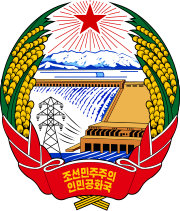7th Central People's Committee | |
|---|---|
 State Emblem of North Korea | |
| 5 April 1982 – 30 December 1986 (4 years, 269 days) Overview | |
| Type | Session of the Central People's Committee |
| Election | 1st Session of the 7th Supreme People's Assembly |
| Leadership | |
| President | Kim Il Sung |
| Secretary-General | Yi Yong-ik Yim Chun-chu |
| Members | |
| Total | 14 |
The 7th Central People's Committee (CPC) of North Korea was elected by the 1st Session of the 7th Supreme People's Assembly on 5 April 1982. It was replaced on 30 December 1986 by the 8th CPC. [1]
